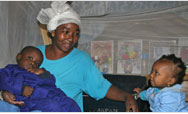You are here » Home » Telling Our Story
Success Story
Health care promoters disseminate lifesaving information to rural areas
Caring for Remote Communities

| |
Photo: USAID/Kristina Stefanova
|
|
This community health care worker, in a village outside Hossana, is one of 4,200 community health promoters that USAID has trained in three regions of Ethiopia.
Child immunization coverage increased from 54 percent in 2003 to 74 percent in 2004.
|
Ethiopia and five other countries account for half of the deaths of children under five years old worldwide. Every year, more than 450,000 Ethiopian children under five die, mostly from preventable diseases. So the simple advice Masame Makebo gives mothers on immunizations, breastfeeding and child nutrition can be life-saving. Anyone who comes to see her learns about the importance of washing hands before touching food and about using latrines.
Masame is one of 4,200 community-selected health promoters trained by USAID to encourage basic health care and immunization in three regions of Ethiopia. By the end of 2005, USAID will have trained another 15,000 health promoters.
The subjects covered in the training for health promoters were based on the findings of a household survey conduced in 2003 and 2004. Now health promoters like Masame are at the front lines of health care, speaking at community health festivals and workshops. A four-day workshop with radio stations, local organizations and government officials last year resulted in the production and broadcast of radio spots on children's immunizations. Six spots have aired, and more are being produced.
Health promotion is part of a larger health extension program, which works simultaneously at the local and federal levels to strengthen routine health services in tandem with famine prevention efforts. Results in southern Ethiopia are already visible. Child immunization coverage increased from 54 percent in 2003 to 74 percent in 2004, and pit latrine coverage also increased.
Print-friendly version of this page (244kb - PDF)
Click here for high-res photo
Back to Top ^ | 

